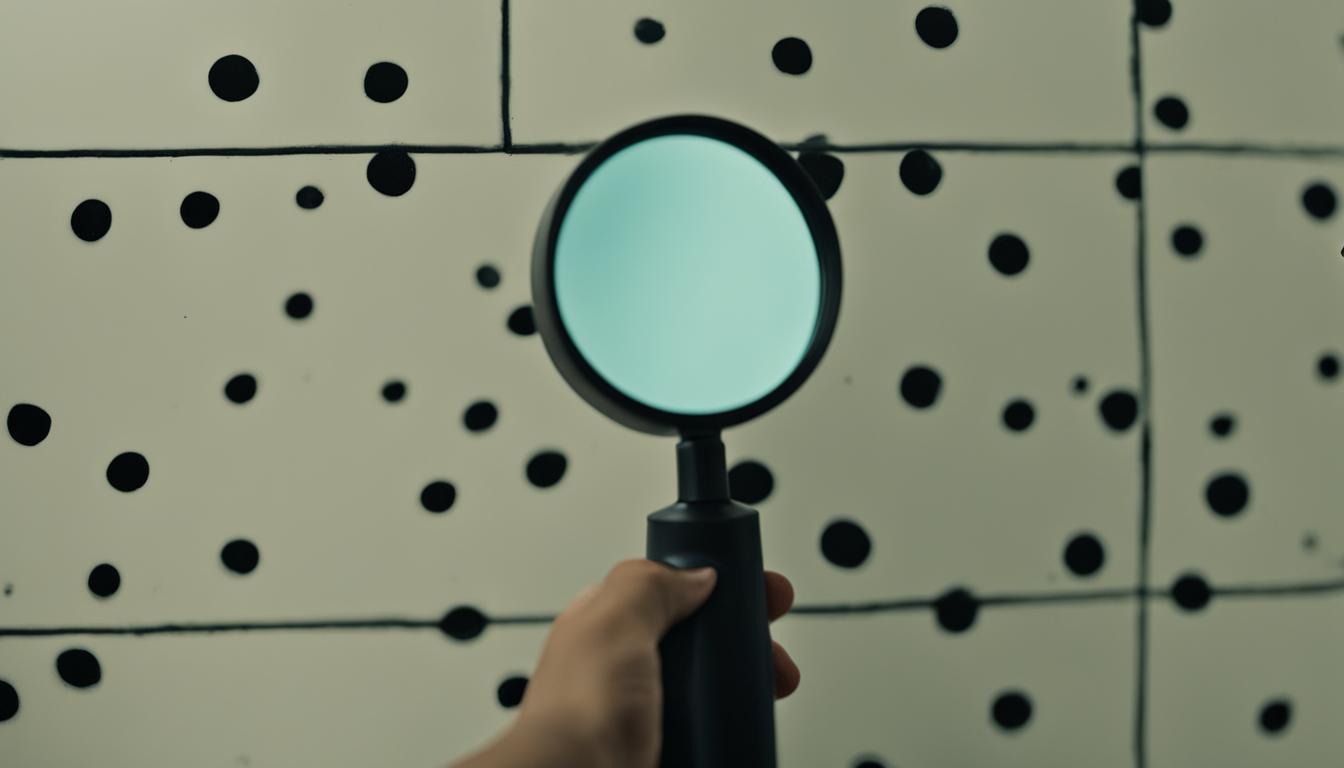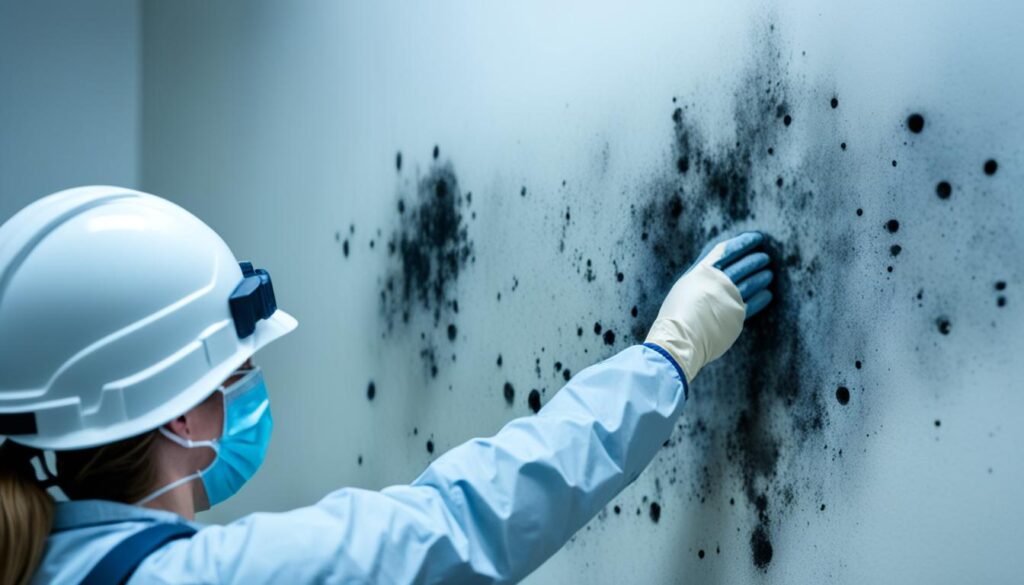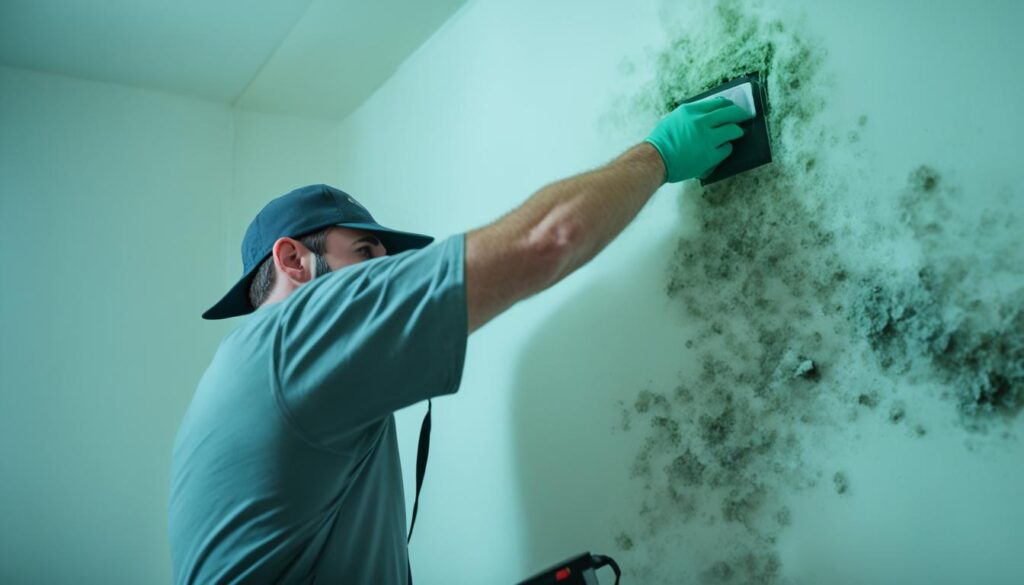
Dealing with Apartment Mold Issues – Quora Guide
Living in a rental apartment comes with its advantages and challenges. While landlords are responsible for ensuring a safe and habitable living environment, tenants may occasionally encounter issues such as mold. Mold not only affects the aesthetic appeal of your apartment but can also pose health risks if not addressed promptly.
If you’re dealing with mold in your rental apartment, it’s crucial to take action to protect your health and preserve the integrity of your living space. In this guide, we’ll provide you with valuable tips on how to remove mold from your apartment and prevent its recurrence.
Key Takeaways:
- Mold can be a common issue in rental apartments and needs to be addressed promptly for health and safety reasons.
- Identifying the presence of mold and understanding its potential health risks is crucial in determining the appropriate course of action.
- Communication with your landlord is vital, as they have a legal obligation to provide a safe and habitable living environment.
- Engaging professional help for mold inspection and remediation can ensure effective and long-lasting solutions.
- Implementing preventive strategies such as proper ventilation and moisture control can help minimize the risk of mold growth in your apartment.
Assessing the Mold Situation in Your Apartment
When it comes to dealing with mold in your apartment, the first step is to assess the situation. Identifying the presence of mold and understanding the potential health risks associated with it is crucial for your well-being and the safety of your living environment. Here’s a guide to help you through the process of assessing mold in your apartment.
1. Identify Mold: Start by visually inspecting your apartment for any signs of mold growth. Look out for visible mold patches on walls, ceilings, or floors. Pay attention to musty odors and water stains, as they can also indicate the presence of mold.
2. Understand Health Risks: Mold exposure can lead to various health problems, especially for individuals with respiratory conditions, allergies, or weakened immune systems. Symptoms of mold exposure may include coughing, sneezing, wheezing, eye irritation, and skin rashes.
3. Hire a Professional for Mold Inspection: While you can perform a preliminary assessment yourself, it’s essential to hire a professional for a comprehensive mold inspection. They have the expertise and the necessary tools to identify hidden mold, assess the extent of the problem, and provide an accurate diagnosis.
“A professional mold inspection ensures a thorough assessment of your apartment, helping you understand the severity of the mold issue and guiding the remediation process.”
4. Choose a Certified Mold Inspector: When hiring a professional mold inspector, make sure they are certified by reputable organizations such as the International Association of Certified Indoor Air Consultants (IAC2) or the National Environmental Health Association (NEHA). Certification ensures that the inspector has undergone rigorous training and follows industry standards.
5. Prepare for the Mold Inspection: Prior to the mold inspection, make sure your apartment is accessible and ready for assessment. Clear any clutter that may obstruct the inspector’s view, and ensure that all areas of concern are easily accessible.
Benefits of Professional Mold Inspection:
- Accurate assessment of the mold problem.
- Identification of hidden mold growth.
- Determination of the cause and source of the mold.
- Expert recommendations for remediation and prevention.
Remember, professional mold inspection is a vital step in effectively dealing with mold in your apartment. It provides you with valuable insights and guidance to address the issue promptly and comprehensively. By understanding the mold situation in your apartment, you can take the necessary steps to ensure a safe and healthy living environment.

“A professional mold inspection is the key to understanding the extent of mold growth in your apartment and the necessary steps to remediate it.”
Mold Remediation for Renters
As a renter, discovering mold in your apartment can be a cause for concern. However, it’s essential to take prompt action to address the issue and ensure a healthy living environment. In this section, we will guide you through the specific steps you can take to remediate mold problems in your rental apartment.
1. Notify Your Landlord
Upon discovering mold in your apartment, it is crucial to notify your landlord immediately. Inform them of the mold problem and request remediation. Be sure to document your communication with the landlord, including timestamps and any responses received.
2. Request Mold Remediation
Request that your landlord hire a professional mold remediation company to address the issue. Mold remediation should be carried out by trained professionals with the proper equipment and expertise to handle mold safely and effectively.
3. Understand Your Tenant Rights
As a renter, it’s important to familiarize yourself with your tenant rights regarding mold remediation. Different states may have specific regulations in place to protect tenants from mold-related health hazards. Research your local laws or consult with a legal expert to understand your rights and obligations as a tenant.
4. Seek Legal Assistance if Necessary
If your landlord fails to address the mold issue or neglects their responsibility to provide a safe and habitable living environment, you may need to seek legal assistance. Contacting a lawyer who specializes in landlord-tenant disputes can help you navigate the legal process and protect your rights as a renter.
By taking these proactive steps, you can effectively address mold issues in your rental apartment and ensure a healthier living environment for yourself and your loved ones. Remember, prompt action is key when dealing with mold problems.

Prevention Strategies to Keep Mold at Bay
Preventing the recurrence of mold in your apartment is essential for maintaining a healthy living environment. By implementing the following strategies, you can effectively combat mold growth and reduce the risk of mold-related issues:
- Maintain Proper Ventilation: Proper ventilation is crucial in preventing mold buildup. Ensure that your apartment has adequate airflow by opening windows, using exhaust fans in kitchens and bathrooms, and utilizing dehumidifiers, if necessary. This helps to reduce moisture levels and create an inhospitable environment for mold to thrive.
- Reduce Moisture Levels: Excessive moisture is a breeding ground for mold. Take proactive steps to prevent moisture buildup by promptly repairing any leaks or water damage in your apartment. Also, be mindful of activities that generate high humidity, such as showering or cooking, and ventilate these areas to minimize moisture accumulation.
- Implement Regular Cleaning Routines: Regular cleaning goes a long way in preventing mold growth. Pay special attention to areas prone to moisture, such as bathrooms, kitchens, and basements. Use mold-inhibiting products and techniques to thoroughly clean these areas, including scrubbing surfaces, removing any visible mold, and drying surfaces completely to prevent moisture retention.
- Monitor Indoor Humidity: Maintaining optimal indoor humidity levels (between 30-50%) is crucial in mold prevention. Use a hygrometer to monitor humidity levels and take corrective measures if they exceed the recommended range. This may include using air conditioners or humidifiers, depending on the climatic conditions.
- Inspect and Maintain Building Structures: Regularly inspect your apartment for signs of water intrusion, such as peeling paint, discoloration, or damp spots. Report any structural issues to your landlord promptly to prevent further damage and mold growth. Additionally, ensure that gutters, downspouts, and drainage systems are functioning properly to divert water away from the building.
By following these apartment mold prevention strategies, you can significantly reduce the risk of mold growth in your living space. Taking proactive steps to prevent mold not only helps protect your health but also ensures a safer and more comfortable environment for you and your family.
Understanding Tenant Rights in Dealing with Apartment Mold
When faced with mold issues in your apartment, it is important to understand your rights as a tenant. Mold can pose serious health risks and compromise the habitability of your living space. As a tenant, you have the right to a safe and mold-free environment, and it is your landlord’s responsibility to provide it.
In dealing with apartment mold, it’s crucial to be aware of your rights and responsibilities to ensure proper resolution. Here are some key points to consider:
Tenant Rights
- Tenants have the right to live in a safe, clean, and habitable environment, free from mold contamination.
- Landlords are legally obligated to address and remedy mold issues promptly.
- If mold is affecting your health or causing damage to your personal belongings, you have the right to seek compensation.
- You have the right to request a professional mold inspection to assess the extent of the mold problem.
- If the mold issue is severe and the landlord fails to take appropriate action, you may have grounds for breaking the lease or seeking legal remedies.
Tenant Responsibilities
- Promptly report any signs of mold to your landlord or property management.
- Cooperate with the landlord or their representatives during the mold remediation process.
- Follow any instructions or recommendations provided by the professionals hired to address the mold problem.
- Take necessary preventive measures to minimize moisture and humidity in your apartment, such as using exhaust fans, properly ventilating the space, and promptly addressing any water leaks or spills.
Understanding your tenant rights and responsibilities is crucial when dealing with apartment mold. By being aware of what you are entitled to and the actions you should take, you can ensure that your living environment is safe and mold-free. If you encounter challenges in resolving the mold issue with your landlord, it may be necessary to seek legal advice or assistance to protect your rights.
Conclusion
In conclusion, dealing with apartment mold issues requires prompt action and a proactive approach. It is crucial to address mold problems in rental apartments as soon as they are identified to prevent further damage and protect your health.
Throughout this guide, we have discussed the importance of assessing the mold situation in your apartment, understanding the health risks associated with mold exposure, and taking appropriate remediation measures. By notifying your landlord, understanding your tenant rights, and implementing preventive strategies, you can effectively combat mold in your apartment and create a safe living environment.
If you’re facing apartment mold issues and need professional assistance, consider contacting Fix Mold Miami. Their team of experts specializes in mold assessment services and can help you identify and address any mold problems in your apartment. Remember, taking action now will not only ensure your well-being but also prevent future mold growth and its associated complications.




